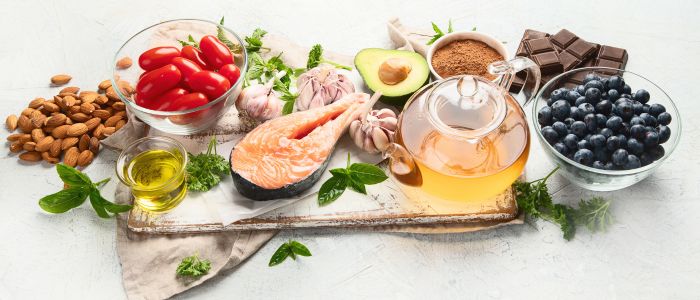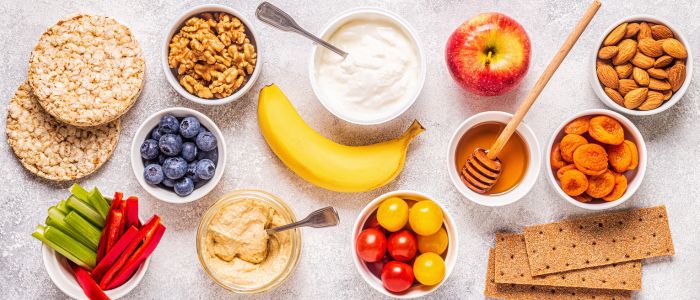
- The Benefits of an Anti-Inflammatory Diet before Plastic Surgery
- Take our Plastic Surgery Quiz to find out if you'd be a good candidate for cosmetic surgery.
- What is an Anti-Inflammatory Diet?
- Benefits of an Anti-Inflammatory Diet for Surgery Preparation and Recovery
- What to Eat for an Anti-Inflammatory Diet
- What to Avoid
- Switching to an Anti-Inflammatory Diet
- Anti-Inflammatory Diet – Sample Meal Plan for a Week
- Anti-Inflammatory Diet – Popular Recipes
- FAQs about the Anti-Inflammatory Diet before Plastic Surgery
- Further Reading about Plastic Surgery with Consultant Plastic Surgeon Anca Breahna
The Benefits of an Anti-Inflammatory Diet before Plastic Surgery
If you’re considering plastic surgery, you likely have many questions about how to best prepare for your procedure and recovery. One important aspect that is often overlooked is nutrition. What you eat in the weeks and months leading up to surgery can have a significant impact on your results and recovery. In particular, following an anti-inflammatory diet rich in nutritious whole foods may offer many benefits.
Take our Plastic Surgery Quiz to find out if you’d be a good candidate for cosmetic surgery.
What is an Anti-Inflammatory Diet?
Inflammation is a natural response by your immune system to injury or irritation. However, chronic low-grade inflammation throughout the body can impede healing. Certain foods, especially processed and high-sugar foods, can promote inflammation. In contrast, an anti-inflammatory eating pattern is based on minimally processed foods that are rich in vitamins, minerals, fibre, and beneficial compounds that help reduce inflammation.
The fundaments of an anti-inflammatory diet are:
- A wide variety of colourful fruits and vegetables
- Whole grains like oats, brown rice, whole wheat, and quinoa
- Legumes such as beans and lentils
- Healthy fats from nuts, seeds, avocados, olive oil, and fatty fish
- Lean proteins like fish, poultry, eggs, and tofu
- Anti-inflammatory spices such as ginger, garlic, and turmeric
- Green tea and water as primary beverages
In contrast, an anti-inflammatory approach limits or avoids:
- Refined carbohydrates like white bread, pasta, and baked goods
- Added sugars in soft drinks, sweets, and many packaged foods
- Processed meats like sausages and lunch meats
- Deep fried foods
- Excess saturated fats from high-fat meats and dairy
- Too much alcohol
Benefits of an Anti-Inflammatory Diet for Surgery Preparation and Recovery
Following an anti-inflammatory diet in the lead-up to your plastic surgery procedure can provide several important benefits:
- Better nutrient stores
Eating a nutrient-dense diet helps build up your body’s reserves of vitamins, minerals, and other beneficial compounds. Having higher nutrient stores gives your body more of the building blocks it needs for healing and helps you better handle the stress of surgery. Main nutrients to focus on include vitamin C, zinc, protein, and omega-3 fats.
- Reduced inflammation
Avoiding pro-inflammatory foods and emphasising anti-inflammatory foods helps reduce chronic inflammation throughout your body. This allows your immune system to mount a more targeted response to surgery. Less overall inflammation can lead to reduced pain and swelling after your procedure.
- Blood sugar balance
Stable blood sugar supports a well-regulated metabolism and consistent energy. Avoiding sugary foods and refined carbs prevents blood sugar spikes and dips that can impair healing. Balanced blood sugar also helps reduce complications like infection or poor wound healing in the crucial early days of recovery.
- Healthy weight
If you have some weight to lose before surgery, an anti-inflammatory diet can help you shed extra pounds while still providing the nourishment your body needs. Achieving a healthy weight reduces risks from anaesthesia and improves surgical outcomes. Even a weight loss of 5-10% can make a difference.
- Better gut health
A fibre-rich, nutritious diet supports the beneficial bacteria in your digestive tract. A healthy gut microbiome strengthens your immune function, reduces inflammation, and even influences your mood and energy levels. Probiotic-rich foods like yogurt, kefir, kimchi, and sauerkraut provide extra support.
- Improved skin quality
The nutrients in whole plant foods and omega-3 fats help keep your skin supple, nourished, and strong. Limiting sugar prevents damage to collagen and elastin. Keeping your skin in top condition allows for better healing of surgical incisions with less noticeable scars.
What to Eat for an Anti-Inflammatory Diet
Let’s get more specific about the anti-inflammatory foods in preparation for plastic surgery. Aim to get a balance of healthy fats, lean proteins, fibre-rich carbohydrates, and ample vitamins and minerals:
- Fats: Avocados, olive oil, fatty fish like salmon, nuts, and seeds provide anti-inflammatory omega-3 fats. About 30% of your calories should come from healthy fats.
- Proteins: Focus on lean options like fish, poultry, eggs, beans, lentils, tofu, and plain Greek yogurt. Protein should comprise around 25% of your diet.
- Carbohydrates: Whole foods like fruits, vegetables, and whole grains provide fibre, vitamins, minerals, and beneficial plant compounds. These healthy carbs should make up around 45% of your intake.
Colourful fruits and vegetables are superstars for fighting inflammation with their high antioxidant and fibre content. Aim for two fist-sized portions with each meal:
- Dark leafy greens like kale and spinach
- Cruciferous veggies like broccoli and cabbage
- Bright red/orange produce like bell peppers, tomatoes, and carrots
- Purple/blue foods like berries and red cabbage
- Sulphur-rich vegetables like onions and garlic
Don’t forget about herbs and spices! Ginger, turmeric, garlic, cinnamon, and rosemary are just a few that have potent anti-inflammatory effects. Use them liberally to flavour your meals.
Stay well hydrated by aiming for 2-3 litres of fluid per day, mainly from water, herbal teas, and low-sodium broths or soups. Limit coffee to 1-2 cups and avoid sugary drinks entirely.
What to Avoid
Just as important as the foods to eat more of are the foods to limit or avoid on an anti-inflammatory diet:
- Sugary drinks and sweets
- Refined grains like white bread and pastries
- Processed snack foods like crisps and biscuits
- Deep-fried foods
- High-fat meats and full-fat dairy
- Foods with hydrogenated oils
- Alcohol
It can be challenging to change your eating habits, but even small shifts away from processed convenience foods to whole, minimally processed fare can make a big difference for your health and surgical outcomes. If a food is premade and comes in a bag or box, check the ingredients. The fewer, the better, and they should be items you recognise, like whole foods and spices rather than chemicals and additives.
Switching to an Anti-Inflammatory Diet
Depending on your current eating patterns, moving to an anti-inflammatory diet can feel like a big change. Remember, it doesn’t have to be all or nothing. Start by making a few simple swaps:
- Choose intact whole grains over refined
- Replace sugary drinks with infused waters or herbal teas
- Snack on fruits, veggies, nuts and seeds instead of crisps or sweets
- Eat fish in place of red meat a few times per week
- Make water your main beverage
- Cook with olive oil instead of butter or hydrogenated oils
Be patient with yourself as you make a gradual shift. Some people find it helpful to keep a food diary to monitor their intake and identify areas for improvement.
Every step you take toward an anti-inflammatory eating pattern is an investment in your health, healing and surgical results. While nutrition is just one piece of the preparation process, it’s an important one. Combine an anti-inflammatory diet with proper hydration, stress management, and ample rest, and you’ll be well on your way to an optimal recovery.
Anti-Inflammatory Diet – Sample Meal Plan for a Week
Here’s a sample meal plan for a week on an anti-inflammatory diet. Keep in mind this is just an example, and you can mix and match based on your preferences.
| Day | Breakfast | Lunch | Dinner |
|---|---|---|---|
| Day 1 | Overnight oats with almond milk, berries, nuts, and a sprinkle of cinnamon | Quinoa and veggie stir-fry with tofu, garlic, and ginger | Baked salmon with roasted broccoli and sweet potato wedges |
| Day 2 | Veggie omelette with spinach, mushrooms, and avocado | Lentil and vegetable soup with a side salad and olive oil dressing | Grilled chicken with sautéed kale and brown rice |
| Day 3 | Greek yogurt parfait with granola, walnuts, and diced mango | Whole grain wrap with hummus, cucumber, tomato, and leafy greens | Baked cod with roasted Brussels sprouts and quinoa |
| Day 4 | Chia seed pudding with coconut milk, pineapple, and shredded coconut | Spinach salad with chickpeas, cherry tomatoes, red onion, and olive oil | Turkey and vegetable chili with a side of brown rice |
| Day 5 | Smoothie with kale, frozen berries, almond butter, and unsweetened almond milk | Tuna salad with mixed greens, radishes, and an olive oil and lemon dressing | Vegetable and bean burrito bowl with brown rice, salsa, and guacamole |
| Day 6 | Whole grain toast with mashed avocado, sliced tomato, and a poached egg | Kale and quinoa salad with roasted sweet potato, pumpkin seeds, and tahini dressing | Grilled tempeh skewers with roasted Mediterranean vegetables and whole grain couscous |
| Day 7 | Buckwheat pancakes topped with almond butter and fresh berries | Carrot-ginger soup with a side of kimchi and whole grain crackers | Baked chicken with rosemary, garlic green beans, and roasted beetroot |
Snack ideas:
- Fresh fruit with a handful of nuts
- Carrot and cucumber sticks with hummus
- Apple slices with almond butter
- Hard-boiled egg with cherry tomatoes
- Greek yogurt with a drizzle of honey and pumpkin seeds
Remember to stay hydrated by sipping on water, herbal teas, and low-sodium broths throughout the day. You can flavour your water with slices of lemon, lime, cucumber, or fresh herbs like mint or basil.
Feel free to adjust portion sizes based on your individual needs and hunger levels. If you have specific dietary restrictions or allergies, make substitutions as needed. The key is to focus on whole, minimally processed foods while limiting sugary, refined, and fried fare. Eating a rainbow of colourful produce, healthy fats, lean proteins, and whole grains will set you on the path to a nourished body and optimal recovery.
Anti-Inflammatory Diet – Popular Recipes
Here are a few delicious and easy-to-prepare recipes that fit well with an anti-inflammatory eating plan:
- Turmeric Chickpea and Spinach Curry
This flavourful vegan curry is packed with anti-inflammatory spices and nourishing ingredients.
https://www.bbcgoodfood.com/recipes/vegan-chickpea-curry-jacket-potato
- Salmon and Veggie Grain Bowls
Omega-3 rich salmon pairs perfectly with fibre-packed veggies and whole grains in this satisfying bowl.
https://www.eatingwell.com/recipe/7987583/salmon-power-bowl/
- Quinoa and Black Bean Stuffed Peppers
Colourful bell peppers serve as a vessel for a protein-rich filling of quinoa, black beans, and veggies.
https://cookieandkate.com/vegetarian-stuffed-peppers-recipe/
- Ginger-Turmeric Butternut Squash Soup
This vibrant soup features the anti-inflammatory powerhouses ginger and turmeric.
https://minimalistbaker.com/tom-kha-gai-butternut-squash-soup/
- Mediterranean Chicken and Farro Salad
This hearty salad combines lean chicken, whole grain farro, and plenty of colourful vegetables.
https://www.skinnytaste.com/mediterranean-chicken-and-farro-salad/
- Blueberry-Almond Overnight Oats
Prep these oats the night before for an easy, antioxidant-rich breakfast in the morning.
https://www.wellplated.com/overnight-steel-cut-oats/
- Sheet Pan Tofu and Vegetable Stir-Fry
Baking the tofu and veggies on a sheet pan makes for an easy, hands-off meal packed with plant protein and fibre.
https://theliveinkitchen.com/vegan-tofu-bowl/
You can always adapt recipes to your tastes and needs. Don’t hesitate to experiment with different anti-inflammatory herbs and spices, swap out vegetables based on what’s in season or your preferences, and adjust cooking methods as needed.
When building your own meals and snacks, focus on combining a balance of fibre-rich whole grains or starchy vegetables, colourful non-starchy vegetables, plant or lean animal proteins, and healthy fats. This winning combo will provide a spectrum of nutrients to support your body’s natural defences and healing abilities.
FAQs about the Anti-Inflammatory Diet before Plastic Surgery
Can I eat dairy on an anti-inflammatory diet?
Some dairy can be included in moderation, but it’s best to choose low-fat or non-dairy options. Yogurt and kefir with live cultures can be beneficial due to their probiotic content. However, some people may be sensitive to dairy, so pay attention to how your body responds. Plant-based alternatives like almond, coconut, or oat milk can be good substitutes.
Are all fats okay to eat on an anti-inflammatory diet?
Focus on healthy, unsaturated fats from sources like nuts, seeds, avocados, olive oil, and fatty fish. These contain beneficial compounds like omega-3s and monounsaturated fats. Limit saturated fats from high-fat meats and dairy, and avoid trans fats from processed foods containing partially hydrogenated oils.
Can I drink alcohol on an anti-inflammatory diet?
It’s best to avoid alcohol, as it can contribute to inflammation and may interact with medications.
How long should I follow an anti-inflammatory diet before seeing results?
Everyone’s body responds differently, but you may start to notice improvements in energy, digestion, and overall well-being within a few weeks. However, to see the full benefits for surgery preparation and recovery, it’s ideal to follow the diet consistently for at least 6 weeks before your procedure and continue through the recovery period.
Can I eat out or socialise while following an anti-inflammatory diet?
Yes, with a bit of planning and communication. Many restaurants now offer whole grain, vegetarian, and vegan options that can fit into an anti-inflammatory plan. Look for dishes featuring vegetables, whole grains, legumes, and lean proteins. Don’t hesitate to ask for modifications like dressing on the side or no added salt. When socialising, offer to bring a dish to share that fits your dietary needs.
Medical References
- Anti-inflammatory supplements: 8 natural options – https://www.medicalnewstoday.com/articles/326067
- Foods that fight inflammation – Harvard Health – https://www.health.harvard.edu/staying-healthy/foods-that-fight-inflammation
- Anti-inflammatory diet: Food list and tips – https://www.medicalnewstoday.com/articles/320233
- Anti-Inflammatory Diets – StatPearls – https://www.ncbi.nlm.nih.gov/books/NBK597377/
- Impact of Mediterranean Diet on Chronic Non-Communicable Diseases and Longevity – https://www.ncbi.nlm.nih.gov/pmc/articles/PMC8231595/
Further Reading about Plastic Surgery with Consultant Plastic Surgeon Anca Breahna
- Read more about Recovery Tips and Instructions
- Read more about Risks and Complications
- Read more about Risks of Smoking before or after Breast Surgery
- Read more about What Is a Healthy Weight for Tummy Tuck Surgery?
- Read more about Concerns and Conditions
- Read more about How Alcohol Affects Plastic Surgery Results



 Ms Anca Breahna, PhD, MSc, FEBOPRAS, FRCS (Plast) is a highly regarded Consultant Plastic Surgeon specialising in the field of Aesthetic and Reconstructive Plastic Surgery. Anca performs a range of
Ms Anca Breahna, PhD, MSc, FEBOPRAS, FRCS (Plast) is a highly regarded Consultant Plastic Surgeon specialising in the field of Aesthetic and Reconstructive Plastic Surgery. Anca performs a range of 